December 2001
Krell FPB-300c
Stereo Amplifier: Measurements
All amplifier measurements are performed
independently by BHK Labs. Please click to learn
more about how we test amplifiers there. All measurement data and graphical
information displayed below are the property of SoundStage! and Schneider
Publishing Inc. Reproduction in any format is not permitted.
- Measurements were made with 120V AC line voltage.
- Power output plotted with both channels driven.
- Gain: 20.9x, 26.4dB.
- Output noise, 8-ohm load: wideband 0.227mV, -80.0 dBW; A
weighted 0.054mV, -92.5 dBW.
- AC line current draw at idle: 4.7A, 3.3A when driven hard
and hot.
- Output impedance: 0.069 ohms.
- This amplifier does not invert polarity.
Power output with 1kHz test signal
- 8-ohm load at 1% THD: 470W
- 8-ohm load at 10% THD: 520W
- 4-ohm load at 1% THD: 800W
- 4-ohm load at 10% THD: 950W
General
The Krell FBP-300c has a wide bandwidth of over 200kHz. Its
output impedance is typical of many solid-state power amplifiers and, consequently, the
difference between open circuit and 4-ohm loading is quite small. This can be seen in
Chart 1. This means that the frequency response into a speaker load will be quite
invariant with frequency. This design has what is termed by Krell as "Sustained
Plateau Bias II," with the consequence that the amount of output stage current is
increased in several steps as the signal level increases. In Chart 2 this has the effect
of changing the amount of distortion as these transitions occur. Chart 2 also shows that
the rated power of 300W into 8 ohms and 600W into 4 ohms is easily met before clipping
occurs (where the distortion rises abruptly). Chart 3 illustrates the desirable
characteristic of a low amount of rise in distortion as frequency increases. The low
output impedance translates in to a high damping factor as seen in Chart 4. In Chart 5,
the harmonic structure for the 10W signal is desirably simple in nature with no harmonics
rising above the noise level above the 5th harmonic.
| Chart 1
- Frequency Response of Output Voltage as a Function of Output Loading |
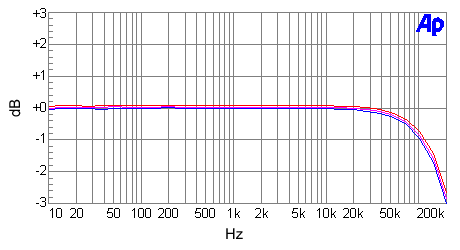
Red line: open circuit
Magenta line: 8-ohm load
Blue line: 4-ohm load
| Chart 2 - Distortion as a Function
of Power Output and Output Loading |
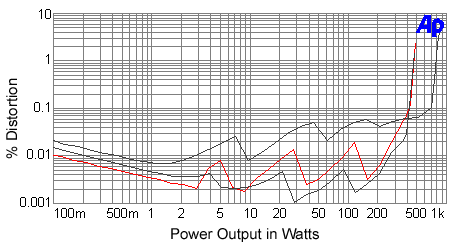
(line up at 1W to determine lines)
Top line: 4-ohm THD+N
Second line: 8-ohm THD+N
Bottom line (red): 8-ohm SMPTE IM
| Chart 3 - Distortion
as a Function of Power Output and Frequency |
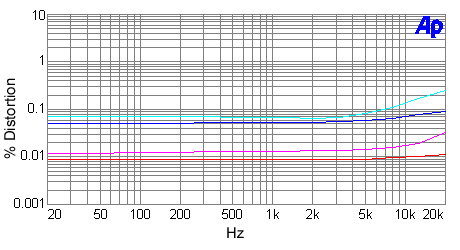
4-ohm output loading
Cyan line: 600W
Blue line: 100W
Magenta line: 10W
Red line: 1W
| Chart 4 - Damping Factor
as a Function of Frequency |
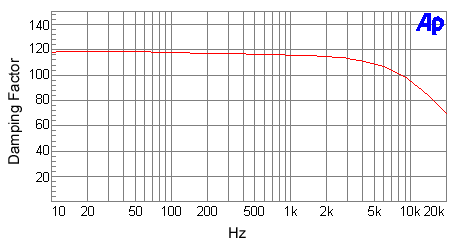
Damping factor = output impedance divided into 8
| Chart 5 - Distortion and
Noise Spectrum |
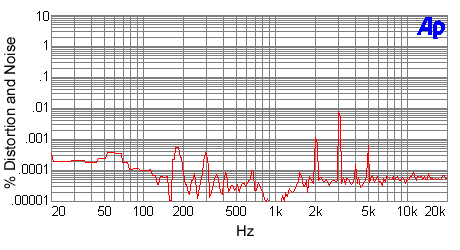
1kHz signal at 10W into a 4-ohm load
|
![[SoundStage!]](../titles/sslogo3.gif) Home Audio
Home Audio ![[SoundStage!]](../titles/sslogo3.gif) All Contents
All Contents



